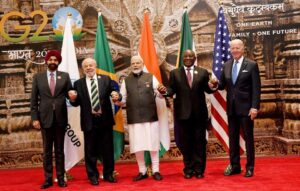The ANC lost its parliamentary majority that it had held since the end of white minority rule in 1994 and needs coalition partners to form a government following the May 29 general election. – Image: Independent Newspapers
By Bheki Mngomezulu
The 2024 general election has been characterised by uncertainty from start to finish. On the eve of the election, court cases delayed the printing of ballots.
First, there was uncertainty about whether the Electoral Commission of South Africa (IEC) should have registered the uMkhonto weSizwe Party (MKP). As it turned out, the IEC was vindicated by the Electoral Court.
Second, the eligibility of former president Jacob Zuma to be a member of Parliament was questioned. Section 47(1)(e) of the Constitution was invoked. The Constitutional Court ruled that the IEC was correct in its interpretation of this section of the Constitution. It was only then that the ballots were printed.
As the election date neared, there was no certainty about the ANC obtaining the 50-plus-one threshold required to constitute the government. Some of us correctly predicted that the ANC would not reach the 50% mark. Indeed, this was the case as the ANC managed only 40%.
After the voting process, 26 political parties filled in the Section 55 forms, listing their concerns about irregularities during the election. They argued that the irregularities negatively affected them and thus impacted the election outcome.
The concerns cast doubt on whether the IEC would announce the results on June 2. As it turned out, the IEC went ahead and announced the results while the concerns raised by the 26 political parties had not been ventilated.
Given the constitutional directive that Parliament must convene its first sitting within two weeks of the announcement of the results, Chief Justice Raymond Zondo announced that the first sitting would be on June 14.
One of the aggrieved political parties, the MKP, sought an interdict to prevent the scheduled sitting. The move created another uncertainty – whether the swearing-in of MPs and the first sitting would continue.
However, government officials and the Constitutional Court justices decided that the sitting would go ahead. The MKP decided to boycott the first sitting. This meant that none of the MKP’s 58 members would attend. Their bone of contention was that it was wrong to arrange the sitting of Parliament while Section 55 complaints were pending.
The MKP’s decision triggered a debate about the interpretation of the Constitution. Section 46(1) states: “The National Assembly consists of no fewer than 350 and no more than 400 women and men elected as members in terms of an election system.” With the MKP not attending, the number would be 342 if all other members attended. There was uncertainty if this would be constitutional.
Others invoked Section 53 of the Constitution which talks about decisions to be taken by the National Assembly. They argued that all that was needed was a majority. What remained unclear was whether the “majority” referred to the overall membership or to only those who had been sworn in and thus become MPs. It all came down to who had the powers, not who interpreted the Constitution correctly.
Another uncertainty was occasioned by the absence of an outright winner in this year’s election. Questions were asked about who would form a coalition with whom. The mudslinging that had characterised the election campaign meant that some politicians had to eat the humble pie and smoke a peace pipe with those they had insulted.
Second, the issue of policy divergence became a discussion point. As the ANC toyed with the idea of forming a grand coalition with the DA, the issue came up. The Special ANC national executive committee meeting took hours as members deliberated on the issue of a coalition. Eventually, a decision was taken to form a government of national unity which would involve the DA but not the MKP.
Here, too, there was uncertainty. The question became: Could there be a government of national unity which excluded the third largest party in the National Assembly, the MKP? The question attracted emotional responses as opposed to common logic which is predicated on the definition and understanding of a GNU.
Once the national conundrum was addressed, the discussion moved to the hung provinces. At the centre of the discussion were Gauteng and KwaZulu-Natal. The question was whether any agreement at the national level would have a bearing at the provincial level.
In this regard, the media briefing by the IFP on Wednesday, gave mixed messages. On the one hand, IFP President Velenkosini Hlabisa said decisions at the national level did not trickle down to provinces. On the other hand, he stated that his party had presented Thami Ntuli as its preferred premier candidate.
This was confusing because if the IFP, DA and ANC were to strike a deal at national level, what would prevent the deal from taking effect in the provinces too? Gauteng and KZN were two provinces that attracted many people’s eyes – not disregarding the Northern Cape where the ANC also failed to obtain an outright majority.
The last uncertainty was on the balance between party interests and national interests. Are politicians prepared to forego their individual and party interests to advance national interests? This question remains unanswered. Only time will tell which direction things will go.
Therefore, the 2024 general election has been characterised by unprecedented uncertainty throughout.
Prof Bheki Mngomezulu is Director of the Centre for the Advancement of Non-Racialism and Democracy at the Nelson (CANRAD) Mandela University




